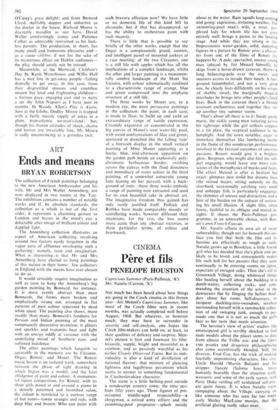CINEMA
Pere et fils
PENELOPE HOUSTON
Capricious Summer (Paris-Pullman, 'A') Me, Natalie (Curzon, 'X') Not much has been heard about how things are going in the Czech cinema in this frozen year—Jiri Menzel's Capricious Summer, like most of the Czech films seen in recent months, was actually completed well before August, 1968. But whatever, or however much, they may have to surrender in severity and self-analysis, one hopes the Czech film-makers can hold on, at least, to their qualities of delicacy and surprise. Men- zel's picture is first and foremost his film: leisurely, supple, bright and mournful as a rainbow, and as passively watchful as his earlier Closely Observed Trains. But its indi- viduality is also a kind of distillation of national flavour: that mixture of glancing lightness and lugubrious pessimism which seems to answer to something fundamental in Czechoslovakian character.
The scene is a little bathing-pool outside a nondescript country town; the time per- haps fifty years ago. Three figures of pre- occupied middle-aged respectability—a clergyman, a retired army officer and the swimming-pool proprietor—splash noisily
about in the water. Rain squalls keep coming and going: capricious, irritating weather. The swimming-pool man's wife, a stout, per. plexed lady for whom life has not gone entirely well, brings a picnic to the landing stage. And while they are sitting in this Impressionist water-garden, solid, dumpling figures in a picture by Renoir pere, a charac- ter from one of the films of Renoir Ms happens by. A pale, spectacled, uneasy young man (played by Jiri Menzel himself), he skips from a horse-drawn caravan, throws a long balancing-pole over the water, and saunters across to invade their lunch. A fair- ground funambulist, and not a very good one, he clearly lives diffidently on his scraps of shabby tinsel, the marginally magical interludes he brings into other people's fixed lives. Back in the caravan there's a blonde assistant enchantress, and together they stir up another tiny summer storm.
That's about all there is to it: hurdy-gurdy music, the sickly young man tottering across his tightrope while the girl collects coppers in a tin plate, the sceptical audience in the lamplight. And the town notables, eager to immolate themselves like lumbering moths in the flame of this nondescript performance, involved in the farcical outcomes of spurious passions. Renoir would give it a brighter glow; Bergman, who might also find the sub- ject engaging, would leave one more con- scious of the metaphysics of masks and faces. The effect Menzel is after is hesitant but exact: glimpses into stolid but dreamy lives (the retired major, sitting sedately on the riverbank occasionally catching very small and unhappy fish, is particularly engaging), the shimmer of unease and distraction, and a hint of the burden on the seducer of sustain- ing his small illusion. A slight film, often funny, faithful to its oblique and muted in- sights. It shares the Paris-Pullman pro- gramme, in an admirable choice, with Ren- oir's own French Cancan.
Me, Natalie affects its own air of sweet vulnerability, though not far beneath this sur- face you feel that both the film and its heroine are effectively as tough as nails. Natalie grows up in Brooklyn, a little Jewish girl who has decided that she's plain and un- likely to be loved, and consequently makes life such hell for her parents that they seem continually to be entering rooms on tiptoe, expectant of enraged sulks. Then she's off to Greenwich Village, doing whimsical things like hauling herself about the building in a dumb-waiter, collecting rocks, and com- manding the attention of the artist in the downstairs flat by flinging the heftier boul- ders about her room. Self-discovery, or incipient duckling-into-swandom, involves surrounding herself with a ramshackle collec- tion of old swinging junk, enough to per- suade one that it is not so much the girl's face as her taste that needs attention.
The heroine's view of artists' studios (the emancipated girl is terribly shocked to find nude models about the place) seems to date from almost the Trilby era; and the film's LSD pranks and drugstore philosophising also come eccentrically blended. Still, the director, Fred Coe, has the trick of making fearfully unpromising characters, like cosy' Uncle Harold (Martin Balsam) and his stripper fiancée (Salome Jens), more humanly bearable than the situation really warrants; and some of the early scenes. with Patty Duke rattling off acidulated self-pity are quite funny. It is when Natalie starts rampaging about the Village, carrying on like someone who has seen far too marY early Shirley MacLaine movies, that the artificial glazing really takes over.








































 Previous page
Previous page